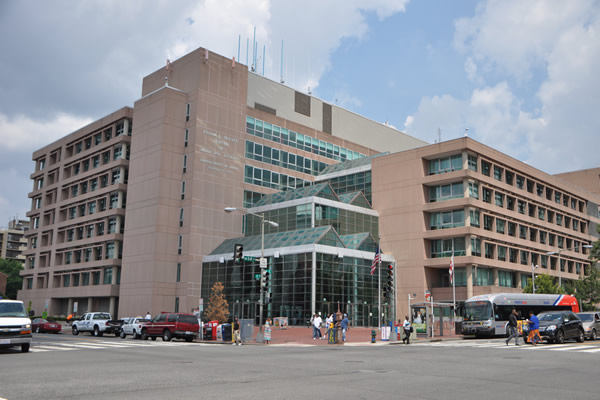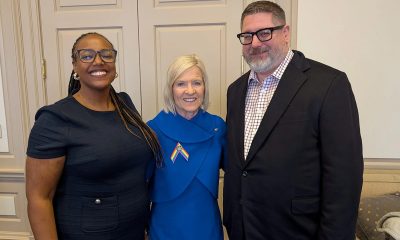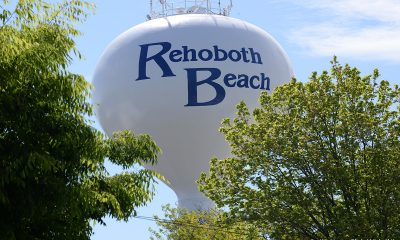Arts & Entertainment
Stadium deal prompts D.C. Center to reconsider move
Mayor promises ‘suitable’ relocation after Reeves building closes
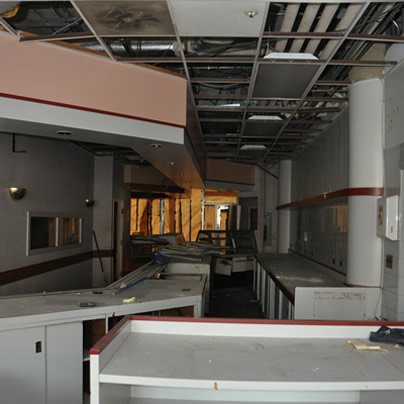
The D.C. Center for the LGBT Community announced late Friday that it has put on hold the renovation of the space into which it planned to move in September in the city’s Reeves Center municipal building following news one day earlier that the building will likely be demolished in three years.
Mayor Vincent Gray and at least three of his top aides said the city would help the D.C. Center find a new location if and when the Reeves building closes.
Gray’s comments came during a news conference on Thursday in which Gray announced that the Reeves building at 14th and U streets, N.W. would be given to a private developer in exchange for land to build a new soccer stadium in the Buzzard Point section of Southwest D.C.
“We are going to make sure they are relocated to a suitable place,” Gray said in response to a question from the Blade.
Gray announced that the land swap was part of a proposed $300 million deal involving the city and D.C. United, the major league soccer team that has long sought to move out of the city’s aging and outdated RFK Stadium.
“Since signing our lease in January of this year, the D.C. Center has expended thousands of volunteer hours and thousands of dollars in renovating the space in the Reeves Center with anticipation of a September move-in date,” Center Board President Michael Sessa said in a July 26 statement.
“Unfortunately, continued renovation of the Reeves Center space will stop effective immediately until we have a better understanding of where the mayor proposes to relocate the D.C. Center,” Sessa said.
The soccer stadium deal and land swap must be approved by City Council. And two other private owners of land needed for the new stadium, including PEPCO, have yet to consent to sell their respective properties.
But Gray and five members of Council who support the deal predicted the remaining obstacles would be overcome because the multi-million dollar project would be of great economic benefit to the city.
Matthew Klein, president of the Akridge development company, which would acquire the Reeves building in the land swap, unveiled an architectural drawing at the news conference of a new building that would be constructed at the site of the Reeves building. The new building is expected to include residential and commercial space.
D.C. Center Executive Director David Mariner noted on Thursday following the mayor’s news conference that the Center’s 15-year lease at the Reeves building requires the Center to spend at least $70,000 to renovate the first-floor, storefront space to get it ready for occupancy.
Mariner said the demolition part of the renovation has been completed through the help of volunteers from the community. With the sudden news that the Center’s stay in the building is likely to be two or three years rather than 15 years or more, Mariner said the Center’s board must decide whether it still makes sense to move into the Reeves building.
“I don’t think we are prepared to invest the time, energy and labor on a massive renovation project if you can’t guarantee that we’ll be there for more than two years,” Mariner told Brian Hanlon, director of the D.C. Department of General Services (DGS) in a conversation following the news conference.
“You mentioned time and money and investment and I think there are ways to incorporate all those things into where we’re going,” Hanlon told Mariner.
Hanlon said one possible way to address the expenses noted by Mariner is for the city to offset them in a new rental agreement at another nearby city-owned building or city-operated building.
Tony Robinson, a spokesperson for the Office of the City Administrator, told the Blade that Gray and other city officials were looking into new rental space for the center at a private building in which a number of city agencies are located at 1250 U St., N.W. The building is two blocks from the Reeves building and one block from the D.C. Center’s current space at 1318 U St., N.W.
The Center had to look for a new location after an unrelated development project required that it vacate its current U Street space.
“What I’m saying is the DGS, the mayor, the government is committed to making sure you all find a home in Ward 1,” Hanlon told Mariner. “It’s my understanding that that’s the epicenter of the community that you serve. So we’re committed to working that through.”
Sessa told the Blade earlier in the day on Friday that Center officials will be meeting next week with Gray’s chief of staff Christopher Murphy and possibly others from the mayor’s office to discuss the Center’s options.
“Of course that’s under review,” said Sessa when asked if the Center was considering dropping plans to move into the Reeves building. “Everything is under review. But what action we take has to be based on our discussion with the city, which hasn’t happened yet.”
In the Center’s statement released later in the day on Friday Sessa said, “We have requested a meeting [with city officials] immediately as we are scheduled to vacate our current space within less than 60 days. We look forward to hearing the mayor’s plans and working with the city to ensure a permanent home for the LGBTQ community.”
Fate of gay nightclub unclear
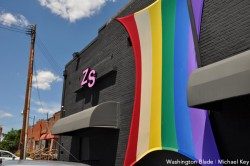
Ziegfeld’s/Secrets (Washington Blade file photo by Michael Key)
Robinson of the City Administrator’s office told the Blade the soccer stadium proposal calls for building a hotel and other businesses such as restaurants and shops near the site of the new stadium.
The gay nightclub Ziegfeld’s/Secrets is located in that area at 1824 Half St., S.W., which is outside the footprint of the soccer stadium but within the area for the ancillary development.
Robinson said the property owners of buildings and land outside the stadium footprint are free to decline to sell to developers and remain in the area as long as they wish.
“There are no plans to do eminent domain for anything except what’s in the footprint of the site [of the stadium],” he said. “There are no plans to close any other facility.”
However, Ziegfeld’s/Secrets currently rents its space in a building owned by Denver businessman Marty Chernoff, who owned and operated the former gay nightclub Tracks in a warehouse building that has since been demolished to make way for an office building.
Chernoff told the Blade that he has known Ziegfeld’s/Secrets principal owner Allen Carroll for a long time and will give Carroll the first right to buy the building if and when Chernoff decides to sell it. He said at least one real estate broker representing a developer has approached him to buy the building.
“I want to make it completely clear that I am not the one forcing him out,” Chernoff said. “So if he chooses to do something because of whatever economic pressure there is or something like that, that would be his choice.”
Carroll couldn’t immediately be reached for comment.
Gay and Lesbian Activists Alliance President Rick Rosendall said LGBT community advocates called on the city to help Ziegfeld’s/Secrets find another suitable location when it was displaced in 2006 by construction of the Washington Nationals Baseball Stadium.
The baseball stadium development forced Ziegfeld’s/Secrets, which features drag shows and male nude dancers, and four other gay clubs to move from the unit block of O Street, S.E., where they had been located for close to 30 years.
Rosendall said GLAA would urge the city to assist Ziegfeld’s/Secrets to find a suitable new home if the club is displaced yet again by development triggered by the proposed soccer stadium.
Television
ICYMI: ‘Overcompensating’ a surprisingly sweet queer treat
A sweet, savvy show about breaking free to embrace your true self

Pride month 2025 is now behind us, and while it’s safe to say that this year’s celebrations had a darker edge than usual, it’s also true that they came with a particularly rich bounty of new queer movies and shows to entertain us – so many, in fact, that even if we are facing a lull until the fall another harvest of fresh content, there are still plenty of titles – which, for whatever reason, were off your radar – for you to catch up on in the meantime.
One of the most notable of these – the bingeworthy series “Overcompensating” (now streaming on Amazon Prime) – will most definitely have been ON the radar for the plentiful fans of creator and star Benito Skinner, the actor/comedian who rose to viral fame through his content on platforms like Instagram, YouTube, and TikTok. For anyone else, it might have easily slipped through the cracks.
Created and written by Skinner as a loosely autobiographical “college comedy,” it aims for the kind of raucous, explicitly sexed-up tone one expects from the genre as it centers on Benny (Skinner), newly arrived as a freshman at prestigious Yates University. A former football jock and “golden boy” at his midwestern high school, he’s the picture of idealized youthful masculinity; he’s also deep in the closet, struggling to keep his sexuality hidden and maintain his macho front under the intense scrutiny of the college’s social scene – and under the resentful eye of his older sister Grace (Mary Beth Barone), who has already secured her own place at the top of the pecking order.
In the first episode, Benny’s difficulties are eased when he meets Carmen (Wally Baram), another freshman trying to navigate the politics of college life; a gamer from a home marred by tragedy, she’s an outsider who feels like she’s putting on an act, too, and they click – giving him the convenient “cover” of female companionship while providing them both with much-needed support and encouragement. He’s also befriended by a handsome film major from England (Rish Shah), who has already caught his eye, stirring other kinds of feelings and possibly even reciprocating them. Meanwhile, he’s being courted by the school’s “exclusive secret society” – headed by his sister’s aggressively “alpha” boyfriend Pete (Adam DiMarco) – and trying to stay interested in his studies, despite a growing realization that a career in business doesn’t actually appeal to him all that much.
That’s a lot to juggle for anybody, even an overachiever like Benny – whose “lucky” life so far has largely been the result of playing a role he is finding harder and harder to maintain. As the series goes on through its eight-episode arc, it becomes clear that he’s not the only one who is “keeping up appearances,” and he, along with the other confused and damaged young people in his orbit, begins the painful (but often hilarious) process of evolution that is required in order to become truly oneself.
Directed toward appealing to a younger demographic, “Overcompensating” is the kind of show that requires a few episodes worth of invested time to make an impression that feels like substance. Full of the bawdy farcical antics that go hand in hand with stories about hormonally charged college kids, it’s not above leaning into the formulas and tropes that have always driven these kinds of comedies. At first, while its broadly comedic strokes and frequently explicit sexual hijinks might elicit plenty of chuckles, the show might easily feel tiresome for more mature audiences; there’s a nostalgic fun to it, made even more appealing, somehow, by the “political incorrectness” of its frequently sexist and homophobic humor, but for a while things may feel like an unnecessary attempt to reinvent “Animal House” for the Gen Z crowd.
By the time the season reaches its halfway point, however, things have started to get real. The antics of these horny almost-adults take on a more pointed absurdity, informed by the increasingly tangled web of defensive deceit they weave among themselves – and, as things draw toward a cliffhanger climax, the consequences of maintaining it – until it achieves a sense of empathy toward them all. There’s a wisdom that smacks of lived authenticity underlying the whole affair, transforming it from the “sexploitative” teen comedy of its surface into something deeper. To be sure, things stay expectedly wacky, and the soap-operatic melodrama of its twists and reversals continue to maintain the show’s “mature YA” appeal; but beneath those trappings, by the end of the season a truer identity has begun to emerge, just as its characters have begun to find their own levels of self-actualization for themselves.
As creator, primary writer, and star, it’s obviously Skinner who deserves much of the credit. While it might be tempting, early on, to dismiss the show as an “ego project,” the internet-spawned sensation proves his talents quickly enough to get past such judgy suspicions, delivering a pitch-perfect blend of sauciness and sensitivity that extends its appeal toward both ends of the taste spectrum; just as crucially, he brings the same aforementioned “lived authenticity” to his winning performance – after all, he’s essentially playing himself in a fictionalized version of his own life – while also making sure that equal time (and compassion) is afforded all the other characters around him, each of whom are pushing at the boundaries of their own respective “closets,” too. It’s unavoidable to notice that – like most of his co-stars – he’s plainly a decade too old to be playing a college student; but by the time we reach that crucial halfway turning point, we’ve become too engaged by him to care.
The show is full of excellent performances, in fact. Relative newcomers Baram and Barone offer layers of complex nuance, while the more familiar DiMarco (“White Lotus”) is close to heartbreaking as the toxic BMOC clinging to the illusion of power as his life begins unraveling around him. Other standouts include the mononymic actress Holmes as Carmen’s “wild child” roommate, solidly likable turns as Benny’s parents from mature veterans Connie Britten and Kyle MacLachlan (whose presence, along with stylish elements in several key scenes, hints at an homage-ish nod to the late David Lynch), and podcaster Owen Thiele as an openly gay fellow student who has Benny “clocked” from the moment they meet. Finally, Lukas Gage makes a deep impression as a former high school teammate at the heart of Benny’s most haunting memory.
There’s no official word yet on whether “Overcompensating” will be renewed for a second season, despite the multiple loose ends left dangling at the end of its first; it has proven to be popular, and Skinner’s large fanbase makes it likely that the story will continue. Even if it doesn’t, the place of uncertainty in which it has left its characters rings true enough to serve as a satisfying endpoint.
As for us, we hope that won’t happen. For all its sophomoric humor, generic plot twists, and purposefully gratuitous sexual titillation, it’s one of the sweetest, kindest, and most savvy shows we’ve seen about breaking free from conformity to embrace your true self – and that’s a message that applies whether you’re queer, straight, or anywhere in between.
Photos
PHOTOS: Independence Day Weekend in Rehoboth
Wicked Green Pool Party, fireworks among festivities

Vacationers and residents alike enjoyed Independence Day Weekend activities in Rehoboth Beach, Del. The Wicked Green Pool Party drew hundreds to the CAMP Rehoboth fundraiser on Saturday. That evening, revelers went to the rooftops to watch the fireworks display.
(Washington Blade photos by Daniel Truitt)













Music & Concerts
Red, White, and Beyoncé: Queen Bey takes Cowboy Carter to D.C. for the Fourth of July
The legendary music icon performed on July 4 and 7 to a nearly sold-out Northwest Stadium.

Just in time for Independence Day, Beyoncé lit up Landover’s Commanders Field (formerly FedEx Field) with fireworks and fiery patriotism, bringing her deeply moving and genre-defying “Cowboy Carter” tour to the Washington, D.C. area.
The tour, which takes the global icon across nine cities in support of her chart-topping and Grammy-winning country album “Cowboy Carter,” landed in Prince George’s County, Maryland, over the Fourth of July weekend. From the moment Beyoncé stepped on stage, it was clear this was more than just a concert — it was a reclamation.
Drawing from classic Americana, sharp political commentary, and a reimagined vision of country music, the show served as a powerful reminder of how Black Americans — especially Black women — have long been overlooked in spaces they helped create. “Cowboy Carter” released in March 2024, is the second act in Beyoncé’s genre-traversing trilogy. With it, she became the first Black woman to win a Grammy for Best Country Album and also took home the coveted Album of the Year.
The record examines the Black American experience through the lens of country music, grappling with the tension between the mythology of the American Dream and the lived realities of those historically excluded from it. That theme comes alive in the show’s opening number, “American Requiem,” where Beyoncé sings:
“Said I wouldn’t saddle up, but
If that ain’t country, tell me, what is?
Plant my bare feet on solid ground for years
They don’t, don’t know how hard I had to fight for this
When I sing my song…”
Throughout the performance, Beyoncé incorporated arresting visuals: Black cowboys on horseback, vintage American iconography, and Fox News clips criticizing her genre shift — all woven together with voiceovers from country legends like Dolly Parton and Willie Nelson. The result was a multimedia masterclass in storytelling and subversion.
The “Cowboy Carter” tour has been a social media sensation for weeks, with fans scrambling for tickets, curating elaborate “cowboy couture” outfits, and tailgating under the summer sun. At Commanders Field, thousands waited in long lines for exclusive merch and even longer ones to enter the stadium — a pilgrimage that, for many, felt more like attending church than a concert.
One group out in full force for the concert was Black queer men — some rocking “denim on denim on denim on denim,” while others opted for more polished Cowboy Couture looks. The celebration of Black identity within Americana was ever-present, making the concert feel like the world’s biggest gay country-western club.
A standout moment of the night was the appearance of Beyoncé’s 13-year-old daughter, Blue Ivy Carter. Commanding the stage with poise and power, she matched the intensity and choreography of her mother and the professional dancers — a remarkable feat for someone her age and a clear sign that the Carter legacy continues to shine.
It’s been nearly two decades since Beyoncé and Destiny’s Child parted ways, and since then, she’s more than lived up to her title as the voice of a generation. With “Cowboy Carter,” she’s not just making music — she’s rewriting history and reclaiming the space Black artists have always deserved in the country canon.
-

 Federal Government2 days ago
Federal Government2 days agoTreasury Department has a gay secretary but LGBTQ staff are under siege
-

 Virginia3 days ago
Virginia3 days agoDefying trends, new LGBTQ center opens in rural Winchester, Va.
-

 District of Columbia2 days ago
District of Columbia2 days agoGay GOP group hosts Ernst, 3 House members — all of whom oppose Equality Act
-

 Opinions4 days ago
Opinions4 days agoUSAID’s demise: America’s global betrayal of trust with LGBTQ people

